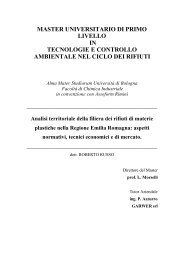master universitario di primo livello in tecnologie per la gestione dei ...
master universitario di primo livello in tecnologie per la gestione dei ...
master universitario di primo livello in tecnologie per la gestione dei ...
You also want an ePaper? Increase the reach of your titles
YUMPU automatically turns print PDFs into web optimized ePapers that Google loves.
In co<strong>in</strong>cidenza con i vari sta<strong>di</strong> del compostaggio, si affermano e predom<strong>in</strong>ano <strong>di</strong>fferenti popo<strong>la</strong>zioni <strong>di</strong><br />
microorganismi. L’<strong>in</strong>iziale decomposizione del substrato è dovuta all’<strong>in</strong>tervento <strong>di</strong> specie microbiche mesofile che<br />
utilizzano rapidamente i composti solubili e facilmente degradabili. Il calore prodotto dalle reazioni esoergoniche <strong>di</strong><br />
questi microorganismi rimane <strong>in</strong>trappo<strong>la</strong>to nel<strong>la</strong> matrice <strong>in</strong> trasformazione a causa del<strong>la</strong> scarsa conducibilità <strong>di</strong><br />
quest’ultima.<br />
A seguito del progressivo accumulo <strong>di</strong> calore, <strong>la</strong> tem<strong>per</strong>atura del substrato com<strong>in</strong>cia a salire, su<strong>per</strong>ando ben<br />
presto <strong>la</strong> soglia del<strong>la</strong> termofilia. Come <strong>la</strong> tem<strong>per</strong>atura si porta sopra i 40 °C, i microorganismi mesofili <strong>di</strong>vengono meno<br />
competitivi e sono <strong>per</strong>ciò progressivamente sostituiti da specie termofile, alcune delle quali risultano capaci non solo <strong>di</strong><br />
resistere ma anche <strong>di</strong> svolgere le normali attività metaboliche a tem<strong>per</strong>ature > 70 °C (es. batteri del genere Thermus).<br />
Raggiunta o su<strong>per</strong>ata <strong>la</strong> soglia <strong>dei</strong> 55 °C, un gran numero <strong>di</strong> microorganismi, ivi comprese le specie patogene <strong>per</strong> l’uomo<br />
e <strong>per</strong> le piante, è <strong>di</strong>sattivato [3].<br />
Dal momento che tem<strong>per</strong>ature al <strong>di</strong> sopra <strong>dei</strong> 65 °C uccidono <strong>la</strong> maggior parte <strong>dei</strong> microbi, riducendo così il<br />
tasso <strong>di</strong> decomposizione del substrato, nelle applicazioni biotecnologiche del compostaggio è opportuno governare il<br />
processo aff<strong>in</strong>ché non venga su<strong>per</strong>ata questa soglia ovvero <strong>la</strong> deriva termica sia ristretta ad un <strong>la</strong>sso <strong>di</strong> tempo il più<br />
limitato possibile [3].<br />
Durante lo sta<strong>di</strong>o termofilo, le alte tem<strong>per</strong>ature accelerano <strong>la</strong> degradazione <strong>di</strong> prote<strong>in</strong>e, grassi e carboidrati<br />
complessi quali cellulosa ed emicellulosa, che rappresentano due tra i più importanti polimeri strutturali delle piante.<br />
Man mano che <strong>la</strong> <strong>di</strong>sponibilità <strong>dei</strong> composti ricchi <strong>di</strong> energia com<strong>in</strong>cia ad esaurirsi, <strong>la</strong> tem<strong>per</strong>atura del<strong>la</strong> matrice <strong>in</strong><br />
trasformazione gradualmente decresce, consentendo alle popo<strong>la</strong>zioni microbiche mesofile responsabili <strong>dei</strong> processi <strong>di</strong><br />
humificazione <strong>di</strong> colonizzare il substrato <strong>per</strong> quel<strong>la</strong> che è stata precedentemente def<strong>in</strong>ita <strong>la</strong> fase <strong>di</strong> maturazione o<br />
f<strong>in</strong>issaggio. Quando lo sta<strong>di</strong>o <strong>di</strong> aff<strong>in</strong>amento giunge a compimento, il prodotto ormai maturo può essere def<strong>in</strong>ito<br />
compost [3].<br />
3.2.3 - L’ecosistema microbico al<strong>la</strong> base del processo<br />
Un’ampia rassegna <strong>di</strong> popo<strong>la</strong>zioni microbiche partecipa al compostaggio. I <strong>di</strong>versi gruppi <strong>di</strong> microorganismi si<br />
sviluppano <strong>di</strong> volta <strong>in</strong> volta <strong>in</strong> risposta ai <strong>di</strong>fferenti livelli <strong>di</strong> umi<strong>di</strong>tà, tem<strong>per</strong>atura, ossigeno e pH all’<strong>in</strong>terno del<strong>la</strong><br />
matrice <strong>in</strong> trasformazione. È proprio grazie a questa <strong>di</strong>versità microbica che il processo <strong>di</strong> compostaggio può procedere<br />
nonostante il mutare cont<strong>in</strong>uo delle con<strong>di</strong>zioni ambientali e trofiche del substrato. I microorganismi responsabili del<br />
compostaggio degradano una vasta gamma <strong>di</strong> composti, da sostanze semplici come zuccheri e am<strong>in</strong>oaci<strong>di</strong> a polimeri<br />
complessi come prote<strong>in</strong>e, polisaccari<strong>di</strong> e lign<strong>in</strong>a. Ciò porta ad una profonda <strong>di</strong>sgregazione e trasformazione del<strong>la</strong> matrice<br />
<strong>di</strong> partenza. Gli <strong>in</strong>tervalli <strong>di</strong> tem<strong>per</strong>atura e <strong>la</strong> <strong>di</strong>sponibilità <strong>di</strong> sostanze nutritive giocano il ruolo pr<strong>in</strong>cipale nel<br />
determ<strong>in</strong>are il gruppo o, ad<strong>di</strong>rittura, le specie <strong>di</strong> microorganismi che caratterizzano <strong>la</strong> popo<strong>la</strong>zione microbica <strong>in</strong> ogni<br />
partico<strong>la</strong>re momento del processo.<br />
Come già accennato, le reazioni degradative procedono rapidamente durante le battute <strong>in</strong>iziali del compostaggio<br />
a causa del<strong>la</strong> <strong>la</strong>rga <strong>di</strong>sponibilità <strong>di</strong> composti facilmente assimi<strong>la</strong>bili.



